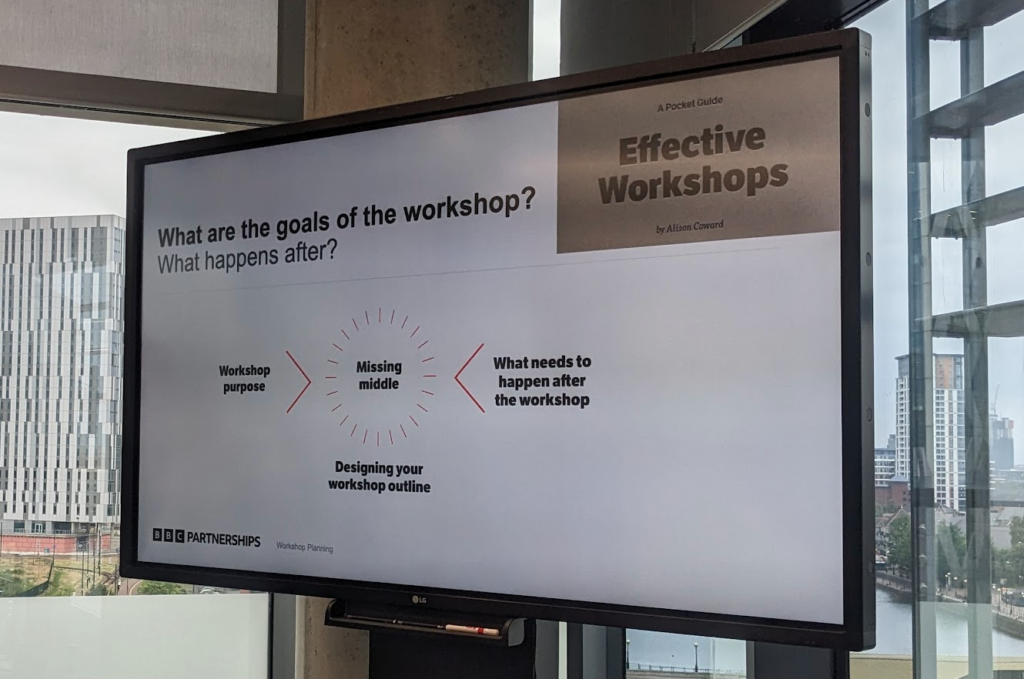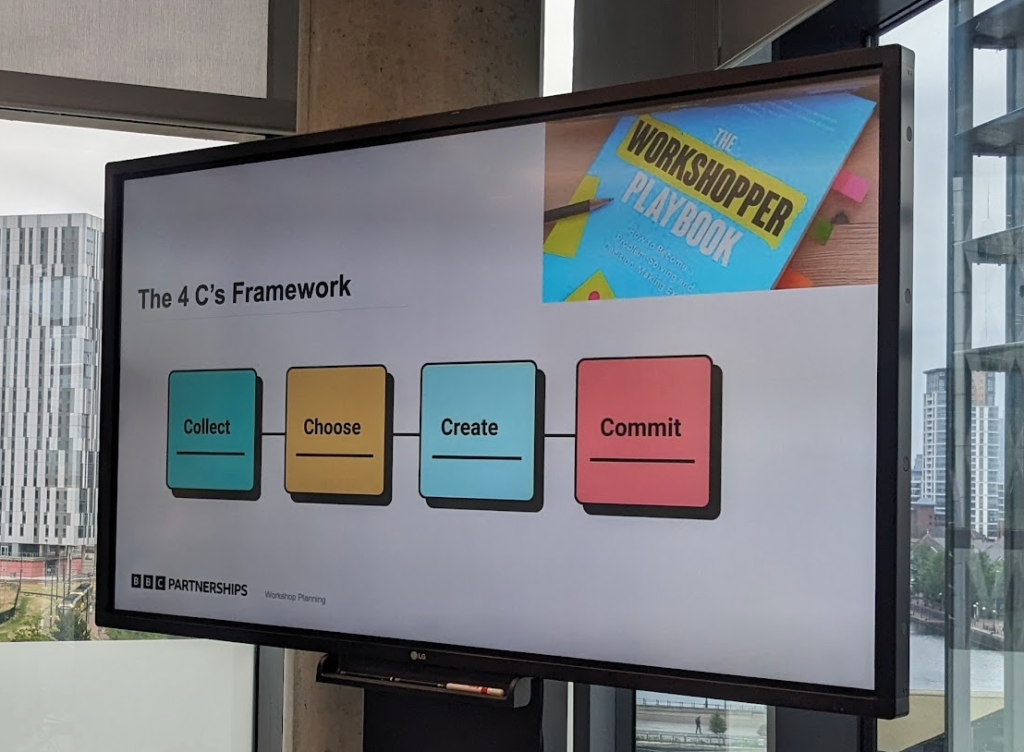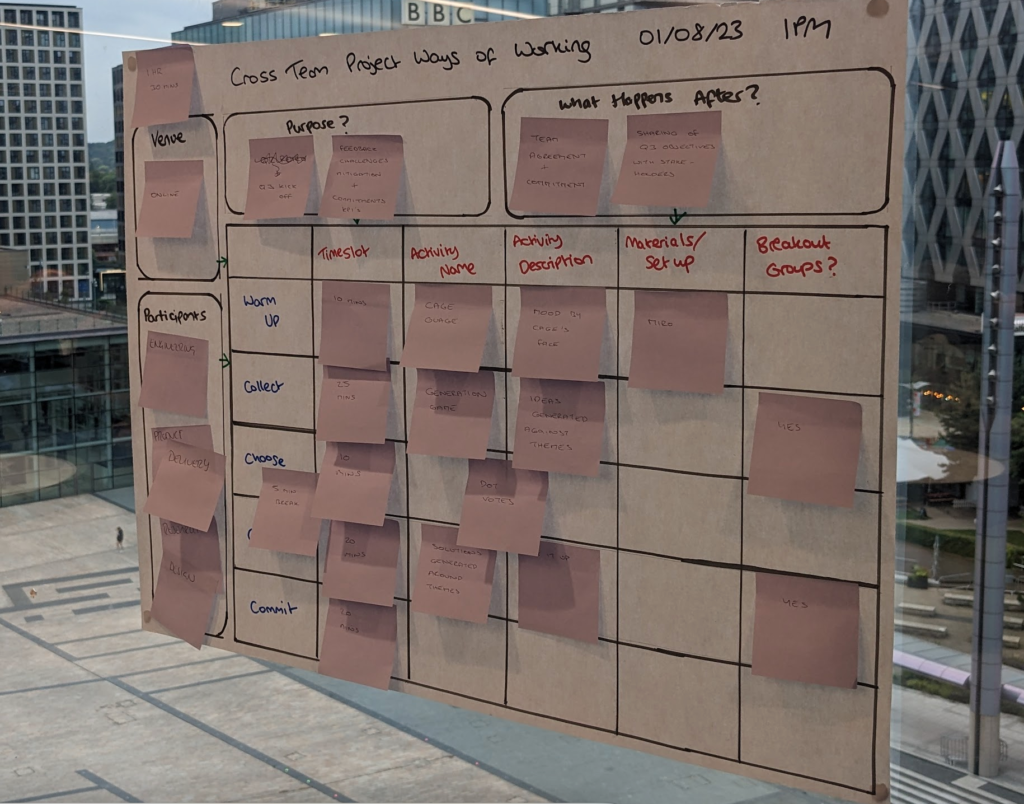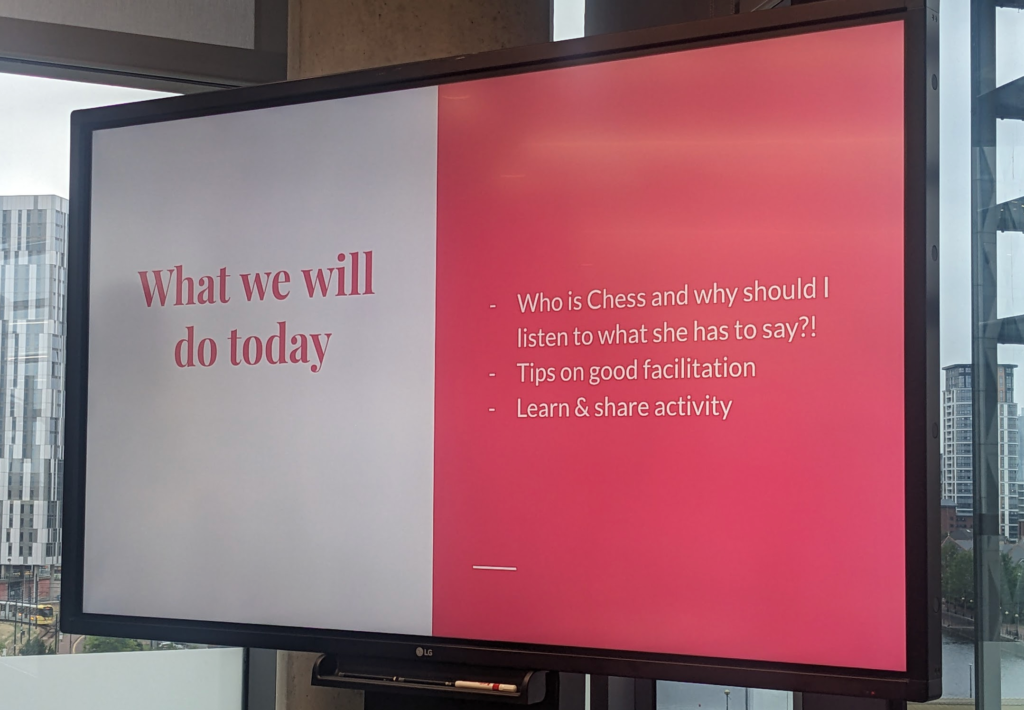
I’ve helped organise Deliver Sessions meetup for a few years, and now I try to write a few notes after each one so I remember all the good topics they cover (like lightning talks and thinking about outcomes). The latest one, in June 2023, was back at the BBC’s offices, where we talked about facilitation skills.
Helping workshops or other group discussions be productive is a really useful skill to have, so I’m always pleased to get a chance to learn with people. I always come away with a combination of new ideas or ways of looking at things, plus plenty of “I used to know that, forgot to keep doing it, and it’s the exact thing that’ll help me” reminders.
We had 2 speakers on the night – Claire Lewis and Chess Marsh – and we collected their advice, plus tips / links / reflections from everyone, on a window full of post-its to help us remember everything after the meetup finished.
Claire Lewis: Workshop planning

Claire recommends puting lots of thought in before the workshop starts: you don’t need to stick to that plan, but if you know what the session’s trying to achieve, and what structure you’d planned to get people there, then you’re in a much stronger position to adapt things if new information starts coming up while the workshop is in progress.
She talked through a book that’s helped her: A Pocket Guide to Effective Workshops by Alison Coward (I’m a big fan of this book too!). This has some very important but often-missed questions that you should get clear on, before thinking about timings, activities, or even whether a workshop is the right choice at all. I love the “missing middle” idea: If you agree what the purpose of the workshop is, and what you expect to happen or be different after it, then the “what should we do in the workshop” question becomes much easier to think about.

Another book – The Workshopper Playbook by Jonathan Courtney – recommends thinking of the workshop in 4 stages: Collect (information, ideas), Choose between them, Create (next steps, sketches), then Commit to what you’ll do next. This sounds similar to the multiple pairs of diverge / converge activities that are used in lots of good workshop plans or design activities.
Combining ideas from both these books, Claire’s been trying out a template to help her plan workshops. She split us into groups and gave us a chance to try it out, either using an idea from someone in the group, or an example scenario she handed out. It’s a useful template, and it was a handy way for lots of people to get advice from their groups on real-life upcoming workshops they needed to plan.

Chess Marsh: Facilitation and connecting people

Chess shared a range of good tips to keep in mind – including lots of easy-to-do things that participants really appreciate, but are easy to forget.
- Introducing yourself and explaining your role during the session (lots of people aren’t familiar with how a facilitator works with groups)
- Setting the scene (what’s happened up till now, and what we’re here to achieve in this workshop)
- Remembering to leave silence and encourage questions and contributions, rather than filling up too much space yourself.
Chess also recommended some books, including The Team Onion by Emily Webber – full of good advice for keeping teams small but well-connected. The Team Onion website has lots of examples, tools and descriptions of how to use this technique in workshops and afterwards.

Chess then gave everyone a chance to discuss their own facilitation challenges and get advice from other attendees. Splitting into groups, we used a version of Troika consulting to structure these conversations. It’s a nice format; because the person askng for advice isn’t allowed to speak or interrupt after their initial description part, you hear all kinds of tangents or reflections that you usually wouldn’t get if you were able to say “I’ve tried that” or otherwise steer people. Helpful new suggestions everywhere.
A window full of facilitaion tips

Throughout the evening, people added their favourite sites / books / anything to help with facitlitation, plus tips they’d like to share or to remember tomorrow. Here’s a few highlights:
- The Miroverse has lots of creative formats for all kinds of workshops. All in Miro, the virtual whiteboard – you can use that with a free account for one person, and share the board with everyone in the workshop.
- Sessionlab is an interesting idea; as well as a huge searchable library of activities, it has a session-building interface where you can plan timings and activities and easily swap in different parts.
- Co-op Experience Library’s facilitation guide has lots of thoughtful advice, and other sections of the library have good stuff too: from the detailed design and content review guide for getting useful feedback on work-in-progress, to a short guide on making the most of check-ins.
- The Retrospective wiki focuses on retros in particular – but helping people get the most out of those conversations has lots in common with workshop facilitation in general, so it’s very worth looking at.
- Liberating structures has lots of good activities for structuring conversations, and guidance on stringing several “microstructures” together into a larger workshop.
There’s too many more too list – I’ve got more post-it photos to look through, let me know if there’s anything in particular you’re interested in and I’ll see if there’s something relevant in there.
Follow Deliver Sessions at deliver-sessions.eventbrite.com to hear when future meetups get announced.